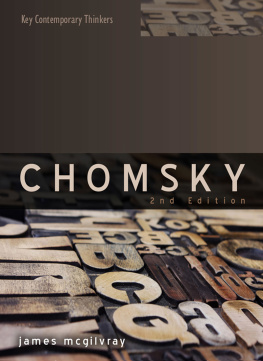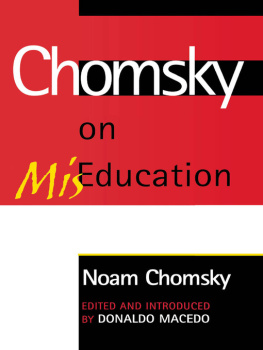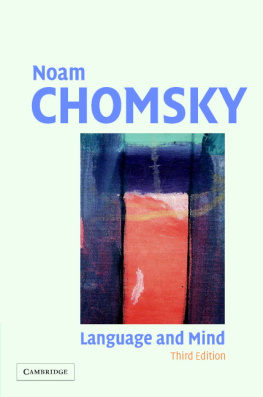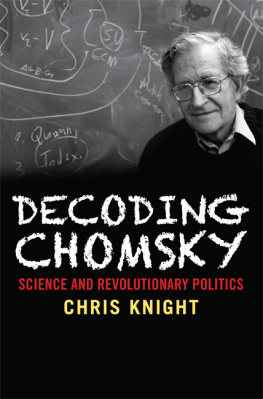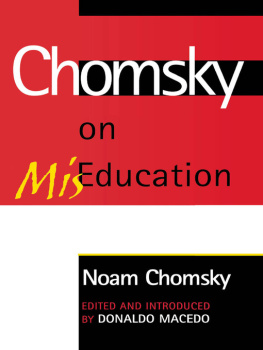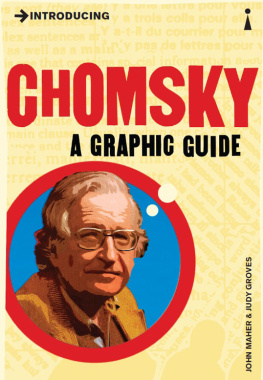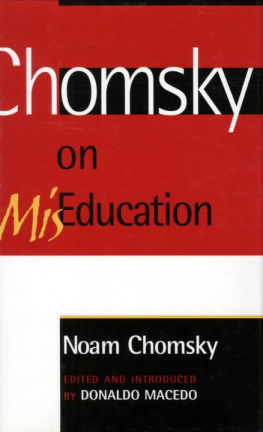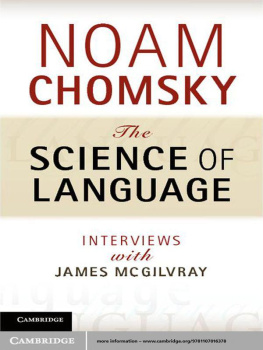
Table of Contents
Key Contemporary Thinkers
Published:
Jeremy Ahearne, Michel de Certeau
Peter Burke, The French Historical Revolution: The Annales School 19291989
Michael Caesar, Umberto Eco
M. J. Cain, Fodor
Filipe Carreira da Silva, G. H. Mead
Rosemary Cowan, Cornel West
George Crowder, Isaiah Berlin
Gareth Dale, Karl Polanyi
Oliver Davis, Rancire
Maximilian de Gaynesford, John McDowell
Reidar Andreas Due, Deleuze
Eric Dunning, Norbert Elias
Matthew Elton, Daniel Dennett
Chris Fleming, Rene Girard
Edward Fullbrook and Kate Fullbrook, Simone de Beauvoir
Andrew Gamble, Hayek
Neil Gascoigne, Richard Rorty
Nigel Gibson, Fanon
Graeme Gilloch, Walter Benjamin
Karen Green, Dummett
Espen Hammer, Stanley Cavell
Christina Howells, Derrida
Fred Inglis, Clifford Geertz
Simon Jarvis, Adorno
Sarah Kay, iek
S. K. Keltner, Kristeva
Valerie Kennedy, Edward Said
Chandran Kukathas and Philip Pettit, Rawls
Moya Lloyd, Judith Butler
James McGilvray, Chomsky
Lois McNay, Foucault
Dermot Moran, Edmund Husserl
Michael Moriarty, Roland Barthes
Stephen Morton, Gayatri Spivak
Harold W. Noonan, Frege
James O'Shea, Wilfrid Sellars
William Outhwaite, Habermas, 2nd Edition
Kari Palonen, Quentin Skinner
Herman Paul, Hayden White
Ed Pluth, Badiou
John Preston, Feyerabend
Chris Rojek, Stuart Hall
William Scheuerman, Morgenthau
Severin Schroeder, Wittgenstein
Susan Sellers, Hlne Cixous
Wes Sharrock and Rupert Read, Kuhn
David Silverman, Harvey Sacks
Dennis Smith, Zygmunt Bauman
James Smith, Terry Eagleton
Nicholas H. Smith, Charles Taylor
Felix Stalder, Manuel Castells
Geoffrey Stokes, Popper
Georgia Warnke, Gadamer
James Williams, Lyotard
Jonathan Wolff, Robert Nozick
Copyright James McGilvray 2014
The right of James McGilvray to be identified as Author of this Work has been asserted in accordance with the UK Copyright, Designs and Patents Act 1988.
First published in 2014 by Polity Press
Polity Press
65 Bridge Street
Cambridge CB2 1UR, UK
Polity Press
350 Main Street
Malden, MA 02148, USA
All rights reserved. Except for the quotation of short passages for the purpose of criticism and review, no part of this publication may be reproduced, stored in a retrieval system, or transmitted, in any form or by any means, electronic, mechanical, photocopying, recording or otherwise, without the prior permission of the publisher.
ISBN-13: 978-0-7456-4989-4
ISBN-13: 978-0-7456-4990-0(pb)
ISBN-13: 978-0-7456-5645-8(epub)
ISBN-13: 978-0-7456-5646-5(mobi)
A catalogue record for this book is available from the British Library.
The publisher has used its best endeavors to ensure that the URLs for external websites referred to in this book are correct and active at the time of going to press. However, the publisher has no responsibility for the websites and can make no guarantee that a site will remain live or that the content is or will remain appropriate.
Every effort has been made to trace all copyright holders, but if any have been inadvertently overlooked the publisher will be pleased to include any necessary credits in any subsequent reprint or edition.
For further information on Polity, visit our website: www.politybooks.com
Preface
Unlike many second editions, this book is substantially rewritten. I rewrote it to emphasize two things. First, I emphasize here much more than I did in the earlier edition Chomsky's view that the science of language should be and in the case of his work, is a natural science. He does not study language in the way the sociolinguist, almost every philosopher, and most psychologists and computational modelers do as language in use, a form of human behavior. He instead uses the methods of the natural scientist, and treats language as a biological organ, a biophysical system in the human head (and human head alone) that like any other biologically based organ grows and develops automatically, given appropriate input.
Second, I emphasize the nature of natural science methods, and explain why and how language is best studied scientifically by respecting the goals of these methods. Because of this, a much larger part of this version than of the last deals with what philosophers call epistemology, and specifically, to a branch of this form of study found in the philosophy of science.
And new to this edition, I add a glossary of some of the technical terms in Chomsky's linguistics. It appears at the end of the main text.
As in the earlier edition, though, I continue to emphasize the difference between the kind of understanding of the world afforded us by commonsense understanding and that offered by natural science. Chomsky's political work is found in the commonsense domain, his study of language in the scientific. And again as in the earlier edition, I suggest a way in which these two aspects of his work can be related.
I am grateful to many for discussion, criticism, and insight, but particularly to Prof. Chomsky himself. I have enjoyed many interchanges with him and benefitted greatly from discussion, including that which appears in print in a volume called The Science of Language, hereafter designated as C&M. I am also very grateful for critical comments and suggestions from readers for Polity, for the patience and encouragement of Polity's Senior Commissioning Editor, Emma Hutchinson, and for the careful and clarifying attention to the text by my copy editor, Fiona Sewell. Finally, I thank the Social Sciences and Humanities Research Council of Canada for invaluable financial support used in the preparation and writing of this work.
Errors in the text that remain are entirely my responsibility.
Introduction
This book is an introduction to Chomsky's work in linguistics, politics, and the philosophies of mind and language. I have tried to make the material in it accessible to anyone willing to read carefully and think about the text. But it will require attention and thought. There are several reasons for this.
Because Chomsky's work questions generally received assumptions about the nature of language, the understanding of the human mind, the status of social organizations and their justification, the sciences of language and mind, limitations on the human mind, the nature of biological evolution, the status of science and its form of understanding, and the concept of human nature and its needs, no one should expect that understanding Chomsky's views will be easy.
Further, it is not enough in an introduction to Chomsky's work just to outline his views on topics like these. In order to actually understand what he is up to, you must also understand why he adopts the views that he does. That requires investigating his basic assumptions and why he maintains them what justification they have, if any. He has tried in various ways to help his reading audiences do this. Perhaps the most successful of those ways is found in his contrast between what he calls the rationalist approach to the study of mind and the empiricist one. That contrast is explained in detail in the text. He places his work as a scientist in the rationalist camp and, ironically, points out that the empiricists are not empirical scientists in their attempts to understand the mind, while the rationalists are. I will explain why and, like Chomsky, will make historical references to figures in both the rationalist (especially Ren Descartes) and empiricist traditions. But judging by the reactions and decisions even of many of those who claim to offer sciences of language and mind, it can be difficult to abandon the empiricist view. It is for many the default approach.
Next page
